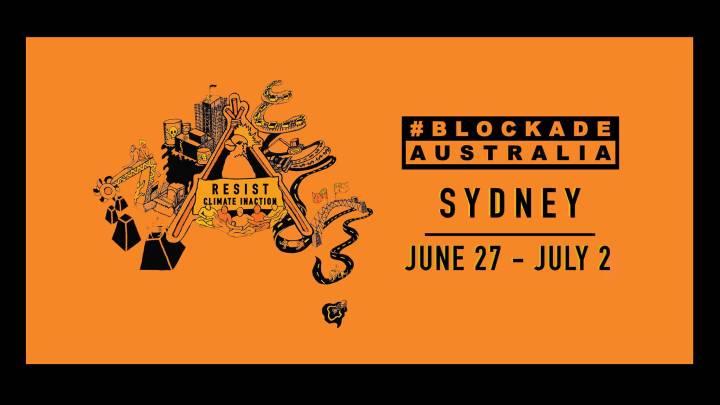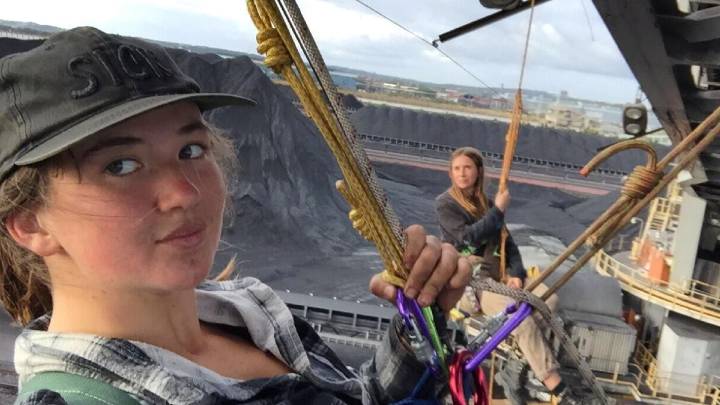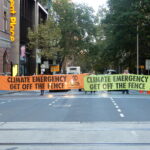Climate Activist Imprisoned Over Successful Blockading of Newcastle Coal Port

The heat is turning up on all climate fronts. Keeping below 1.5°C on preindustrial levels is looking increasingly unlikely, while political leaders globally are growing more cunning at presenting their inaction as movement, and climate activists are becoming far more effective in their methods.
Morrison’s COP26 performance amplified the understanding that our nation is the world’s chief climate pariah, whether that be from his toing and froing on attending, his delivery of a net zero plan devoid of any details, or the key positioning of a gas company display in the nation’s event stall.
In response to Canberra’s inaction, recently formed activist group Blockade Australia disrupted the world’s biggest coal port in Newcastle, and its surrounding rail network, over the eleven day period ending on 18 November to draw attention to our country’s role in the climate crisis.
As Blockade Australia spokesperson Emma put it, “the collective is taking radical and offensive direct action against the extractive supply chains and systems that are creating, causing and perpetuating the climate crisis”.
And so effective was Blockade Australia in taking nonviolent direct action that shutdown Newcastle Coal Port for days, and in turn hindered corporate profits, that the authorities have now seen fit to punish one young activist with a prison sentence for trying to save the planet.

A sign of things to come
“This is an extreme escalation that we’ve seen quite suddenly,” said Zianna, another Blockade Australia spokesperson. “He’s being vilified because of his connection to Blockade Australia and the frustration of the police and the court at what we’ve pulled off over the last two weeks.”
Prominent climate activist Sergeio Herbert was sentenced to 12 months imprisonment on Monday, with non-parole set at 6 months. Magistrate Janine Lacy moved to punish the 22-year-old with hard time over taking nonviolent direct action on Awabakal and Worimi Country in Mulubinba-Newcastle.
And what Blockade Australia has pulled off over the last two weeks was twenty coordinated acts of civil disobedience that have consisted of abseiling in to stop the operation of machinery, climbing atop trains to bring them to a halt and setting up installations to block rail lines.
The ongoing demonstrations led NSW police minister David Elliott to condemn them as “economic vandalism”, while police minister Mick Fuller threatened charging activists with interfering with a railway with intent to cause bodily harm, which carries 25 years imprisonment.
“They’ve obviously used a lot of different fear tactics to squash dissent,” Zianna told Sydney Criminal Lawyers. “So, while we were deeply shocked, we weren’t surprised that they were using these tactics to ensure we don’t take further action – which won’t work.”

Ramping up climate punishment
By the fourth day of the port shutdown, Blockade Australia was able to announce it had blocked coal trains on seven occasions. And it was for his participation in one of these actions that Sergeio was first arrested and charged.
While last week saw the activist, who’s been taking climate action since he left high school, arrested under suspicion as he was walking around Kooragang Island in the Hunter Wetlands National Park. He was charged with assisting in the obstruction of a railway and hindering mining equipment.
“We see the legal system in persecuting Sergeio as more of a flaw in the Australian system, and not a flaw of his character,” Zianna emphasised. “He is only 22 and would prefer not to be in this position. I believe he has been forced into this action by Australia’s role in the climate crisis.”
Commissioner Fuller stated on 16 November that the activists were placing public safety at risk and endangering lives, so NSW police would start charging them with interfering with a railway with intent to cause harm under section 211 of the Crimes Acts 1900 (NSW), which carries 25 years.
“Threatening protesters with 25 year prison sentences for blocking coal trains without causing physical harm to anyone is a draconian overreach of police power,” Blockade Australia responded in a statement.
“The institutions of Australia, including the police force, are hellbent on protecting the industries that are fuelling one of the worst crises in history.”
Emma relates that a few activists have since been charged with this crime.
Raiding whoever
In relation to Blockade Australia’s eleven day action, NSW police raided Newcastle’s Hunter Community Environment Centre, despite the fact that it and its members had no connection to Blockade Australia and the shutting down of Newcastle Coal Port.
HCEC spokesperson Georgina Woods labelled the raid “a heavy-handed response from the police to what is essentially a peaceful activity happening in the port unconnected to our little local environment centre”. And the operation resulted in a trailer load of materials being confiscated.
“People in the local community who aren’t connected to us at all have been pulled over and had their car searched,” Emma added. “And they raided the centre with around 30 police taking all their phones and laptops for the duration of the court cases.”
The climate activist advised that NSW police had set up Strikeforce Tuohy directly in response to the coal port actions, while activists have been placed on 24 month community corrections orders by the courts, and these have included the application of 12 month non-association orders.

Climate mobilisations to grow
“The Australian government and its ruling class know the problem that we are in,” Emma further made clear. “This action isn’t that drastic when we’re talking about threats to all life on Earth, and the intentional destruction of the natural environment.”
Released in August, the IPCC’s latest climate report found that “unless there are immediate, rapid and large-scale reductions in greenhouse gas emissions, limiting warming to close to 1.5°C or even 2°C will be beyond reach”.
A post-COP26 analysis outlines that despite its pledges the globe is now heading for 2.4°C of warming.
Blockade Australia’s 20th and last action at Newcastle Coal Port saw two activists lock on and shut down critical machinery on 18 November.
The climate activist collective will be descending upon Sydney for a week of climate actions commencing on 27 June. And it’s calling on people from all walks of life to assist in the disruption of “the centre of Australia’s destructive operations to do what is necessary for a liveable future”.
“It is our duty as people from this continent to push back against Australia,” Zianna concluded. “The best way to support Sergeio and to push back against state repression is to expand the resistance.”
“This will bring more people into the movement because it has exposed the criminality of Australia.”







